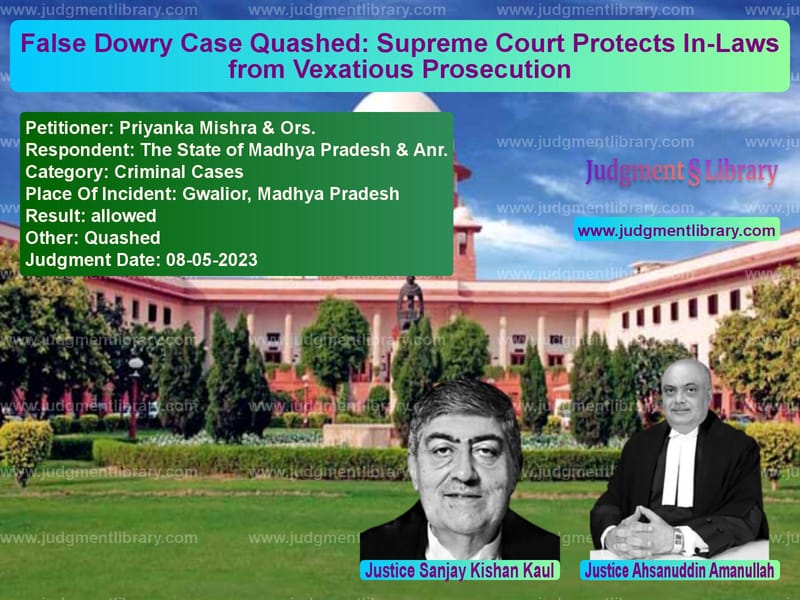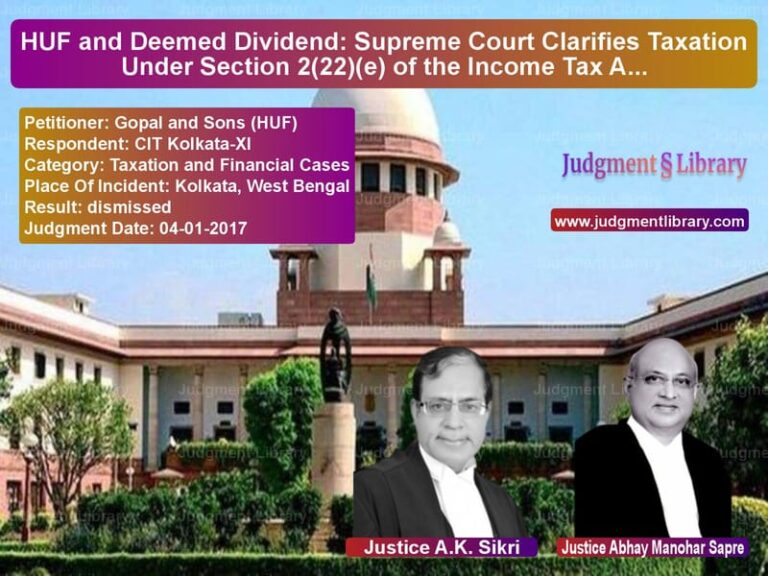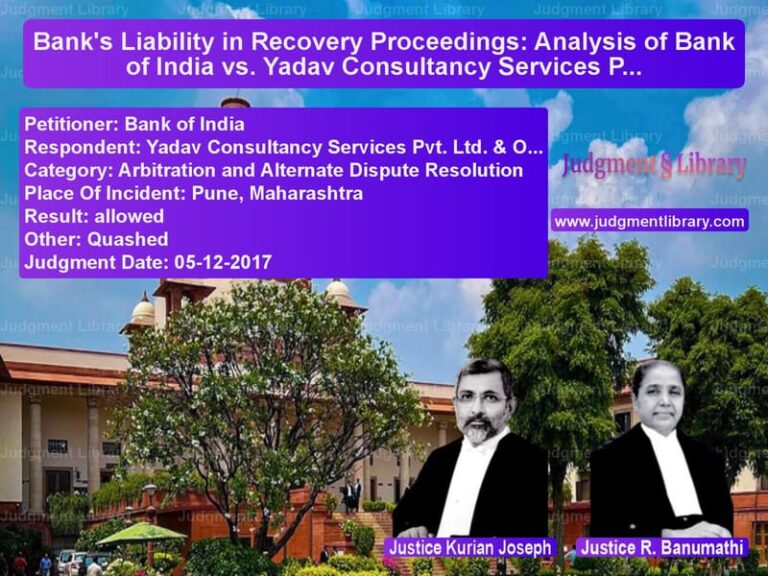False Dowry Case Quashed: Supreme Court Protects In-Laws from Vexatious Prosecution
The case of Priyanka Mishra & Ors. vs. The State of Madhya Pradesh & Anr. revolves around allegations of dowry harassment and cruelty under Section 498-A of the Indian Penal Code (IPC). The Supreme Court was tasked with determining whether the accusations made against the appellants, who were the in-laws of the complainant, warranted prosecution or if they were an abuse of legal process. After analyzing the facts and legal precedents, the Court quashed the FIR against the in-laws, highlighting the misuse of dowry laws in matrimonial disputes.
Background of the Case
The case arose from an FIR registered at Mahila Thana, District Gwalior, under Section 498-A and Section 34 of the IPC, along with Section 4 of the Dowry Prohibition Act. The complainant, Respondent No. 2, alleged that her in-laws and husband had harassed her for dowry and had demanded INR 50 lakh in cash along with 15 tolas of gold jewelry.
According to the complainant, her father had already given INR 5 lakh, a diamond ring worth INR 50,000, and other household articles amounting to INR 30 lakh at the time of marriage. Despite this, she claimed that she was taunted, mentally harassed, and even forced to undergo an abortion against her will in Hyderabad.
In response to these allegations, the in-laws, who were the appellants in this case, approached the Madhya Pradesh High Court under Section 482 of the Criminal Procedure Code (CrPC) to quash the FIR. However, the High Court dismissed their petition, leading them to appeal before the Supreme Court.
Appellants’ Arguments
The counsel for the appellants contended that:
- The complainant had barely lived with her in-laws, as she moved to Hyderabad with her husband shortly after marriage and later shifted to Sweden.
- The allegations were false and filed as a retaliatory measure after divorce proceedings were initiated in Sweden.
- There were inconsistencies in the complainant’s statements under Section 161 and 164 CrPC regarding whether she had left for her parental home voluntarily or was forced out.
- No medical evidence supported the claim of forced abortion.
- The complainant’s husband had filed a complaint with the police three days before she lodged her FIR, alleging that she was threatening to implicate him and his family in false criminal cases.
Respondent’s Arguments
The complainant’s counsel argued:
- The FIR contained sufficient allegations to establish a prima facie case under Section 498-A IPC.
- As per the Supreme Court’s judgment in State of Haryana v. Bhajan Lal, an FIR should not be quashed at the initial stage unless it is entirely frivolous.
- The allegations should be tested during trial rather than being dismissed summarily.
- There was a history of physical and mental harassment, and the complainant had suffered cruelty at the hands of her in-laws.
Supreme Court’s Observations
The Supreme Court critically examined the evidence and noted several discrepancies:
- The complainant had lived with her in-laws for less than three weeks after marriage before moving to Hyderabad with her husband.
- She later lived in Sweden with her husband, making it unlikely that the in-laws had an opportunity to harass her during this period.
- The allegation of forced abortion lacked any supporting medical records.
- The complainant’s father-in-law was living in a different city due to work, and her sister-in-law was employed in Pune, making their involvement in daily harassment improbable.
- The timing of the complaint, which was filed shortly after the husband’s police complaint about being threatened, indicated a retaliatory motive.
Key Judgment Excerpt
The Court held:
“The facts in totality evince that Respondent No.2 resided for less than three weeks in the matrimonial home from the date the marriage was solemnized, then lived with her husband at Hyderabad for quite some time, and finally moved to London and then Sweden. Subsequently, Respondent No.2 upon returning to India, filed the criminal case in question. We think the same is a retaliatory tactic, inasmuch as the Appellants herein are concerned.”
The Court further referred to its previous ruling in Kahkashan Kausar v. State of Bihar, where it held that:
“General and omnibus allegations cannot manifest in a situation where the relatives of the complainant’s husband are forced to undergo trial.”
Final Verdict
The Supreme Court set aside the Madhya Pradesh High Court’s judgment and quashed the FIR against the appellants. It emphasized that criminal proceedings should not be used as tools of vengeance in matrimonial disputes.
The Court clarified that its ruling only applied to the in-laws and did not affect any proceedings against the complainant’s husband. It also allowed the complainant to pursue any lawful remedies against her husband in India or Sweden.
Petitioner Name: Priyanka Mishra & Ors..Respondent Name: The State of Madhya Pradesh & Anr..Judgment By: Justice Sanjay Kishan Kaul, Justice Ahsanuddin Amanullah.Place Of Incident: Gwalior, Madhya Pradesh.Judgment Date: 08-05-2023.
Don’t miss out on the full details! Download the complete judgment in PDF format below and gain valuable insights instantly!
Download Judgment: priyanka-mishra-&-or-vs-the-state-of-madhya-supreme-court-of-india-judgment-dated-08-05-2023.pdf
Directly Download Judgment: Directly download this Judgment
See all petitions in Dowry Cases
See all petitions in Domestic Violence
See all petitions in Alimony and Maintenance
See all petitions in Judgment by Sanjay Kishan Kaul
See all petitions in Judgment by Ahsanuddin Amanullah
See all petitions in allowed
See all petitions in Quashed
See all petitions in supreme court of India judgments May 2023
See all petitions in 2023 judgments
See all posts in Criminal Cases Category
See all allowed petitions in Criminal Cases Category
See all Dismissed petitions in Criminal Cases Category
See all partially allowed petitions in Criminal Cases Category







